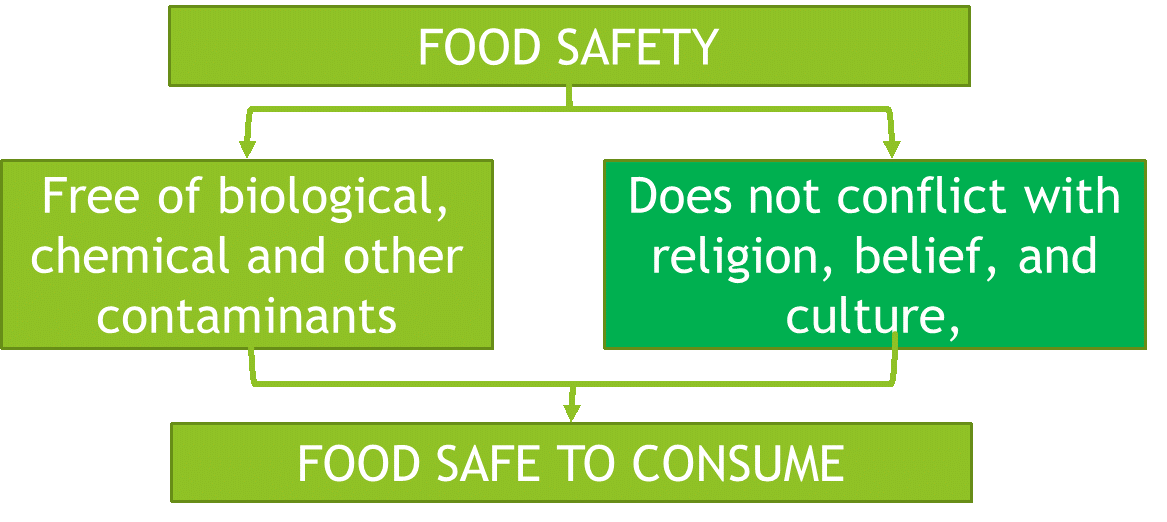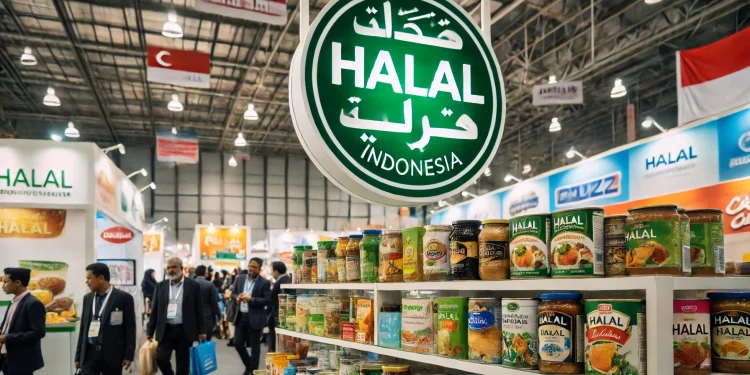As a country with the largest Muslim population in the world, namely 229 million or around 87.2% of the total population, Indonesia has the potential to develop all aspects of halal. Based on data from the Global Islamic Economy Report 2020/2021, Indonesia’s consumption of halal products in 2019 reached $144 billion, making Indonesia the largest consumer in the halal sector (DinarStandard, 2020/21). Recognizing this, the Indonesian government has initiated strategic efforts to establish the country as a global hub for halal products, aiming to enhance national economic growth and societal welfare.
The introduction of the Masterplan for Indonesian Islamic Economy (MEKSI) 2019–2024 (BPPN, 2019) and the Halal Economic Report highlight Indonesia’s ambition to strengthen its foothold in the global halal economy. These initiatives aim to make Indonesia not only a consumer but also a leading producer of halal goods and services. With robust policies in place, the halal industry offers Indonesia opportunities for economic diversification, increased exports, and sustainable development.
Indonesia’s halal economy spans diverse sectors, including food, pharmaceuticals, cosmetics, tourism, and fashion. For instance, halal food products remain central to consumer demand. Meanwhile, sectors like halal cosmetics and fashion are experiencing significant growth, driven by young, tech-savvy consumers seeking ethically produced goods. These trends align with global demands for sustainable and ethically certified products.
With robust policies in place, the halal industry offers Indonesia opportunities for economic diversification, increased exports, and sustainable development.
Legal Framework: Strengthening Assurance and Consumer Protection
A positive response to halal issues, especially related to food (Figure 1), pharmaceuticals, and cosmetics has also been carried out by the government of the Republic of Indonesia with the issuance of several laws and regulations, such as food (UU No 18, 2012), food safety (PP No 86, 2019) and processed food labels (Peraturan BPOM No 20, 2021). However, the existing regulations were created in a fragmented and inconsistent manner, often overlapping and lacking a systematic approach. For example, food safety based on government regulation only refers to the conditions and practices that maintain the quality of food to prevent contamination and foodborne illness (PP No 86, 2019). As a result, they cannot serve as a robust legal foundation to effectively regulate the halal status of products for producers (business actors) or provide clear guarantees to consumers. This lack of legal certainty has left a gap in ensuring halal product assurance despite its critical importance, particularly in the context of consumer protection and global trade.

Figure 1. Definition of food safety based on Law UU 18/2012
Since the previous regulations were fragmented, Indonesia has implemented new comprehensive laws, notably Law No. 33 of 2014 on Halal Product Assurance (UU-JPH) (UU No 33, 2014). This law establishes the framework for mandatory halal certification, ensuring consumer protection and fostering fair competition among businesses. Under this law, all products distributed, imported, or traded in Indonesia must be halal-certified, except those explicitly made from haram (forbidden) materials (PP No 39, 2021). The scope of UU-JPH extends beyond food to include pharmaceuticals, genetically engineered products, and consumables such as cosmetics and household items. The law’s holistic approach ensures halal compliance across the entire production chain, covering sourcing, processing, packaging, and distribution. The government has adopted a phased implementation schedule to make the transition manageable. For example, the first phase, from 2019 to 2024, focuses on food, beverages, and slaughter services. Subsequent phases will address more complex categories like cosmetics, traditional medicine, and genetically engineered products, ensuring adequate preparation for compliance.
Halal Certification Schemes in Indonesia
Halal assurance in Indonesia is supported by two primary certification schemes: the self-declare scheme and the regular scheme.
1-The Self-Declare Scheme: Simplifying Certification for SMEs
The self-declare certification scheme was introduced in 2021 as an innovative approach to support small and micro enterprises (SMEs). It allows businesses to declare their products halal through a simplified process regulated by multiple laws, including Government Regulation No. 39 of 2021 on Halal Product Assurance (JPH) (PP No 39, 2021)and Ministry of Religious Affairs Regulation No. 20 of 2021 (PMA No 20, 2021). Businesses participating in this scheme benefit from free certification costs, as the IDR 300,000 ($19) processing fee is subsidized through national and regional budgets or by facilitators (Kep BPJPH No 22, 2023). Eligible SMEs must collaborate with registered Halal Product Process Assistance Institutions (LP3H), including Islamic organizations, accredited universities, and recognized Islamic institutions. LP3H representatives conduct on-site verification and validation to ensure compliance with halal standards.
2-The Regular Scheme: Comprehensive Certification for All Businesses
The regular scheme applies to businesses of all sizes, including medium and large enterprises. It involves more extensive evaluations and auditing processes. Companies must bear the certification costs, which include registration, halal determination, and inspection fees. Businesses seeking certification through the regular scheme can choose from registered Halal Inspection Institutions (LPH), such as LPPOM, PT Sucofindo, PT Surveyor Indonesia, or other approved organizations. Halal auditors from these institutions perform detailed inspections to ensure compliance across the production chain.
In recent years, Indonesia has embraced digital innovation to streamline halal certification. BPJPH’s (Badan Penyelenggara Jaminan Produk Halal – Halal Product Assurance Organizing Body) SIHALAL platform allows businesses to register their products online, track application statuses, and receive certification updates. This system reduces bureaucratic delays and increases transparency. Additionally, SIHALAL incorporates mobile accessibility, enabling businesses to apply for certification and manage compliance on the go. Future developments include integrating blockchain technology to enhance supply chain transparency and traceability.
Raising consumer awareness about halal certification is essential. Although halal products dominate the market, many consumers remain unaware of the importance of certification.
Overcoming Challenges in Halal Certification
Despite its robust legal framework, Indonesia’s halal industry faces several challenges. First, fragmented and overlapping regulations often lead to confusion among businesses. While UU-JPH serves as an umbrella law, its implementation requires coordination among various agencies, including BPJPH, MUI, and LPH (Halal Inspection Institutions). Misaligned roles and overlapping mandates have sometimes slowed certification processes.
Second, the financial and technical barriers for small and medium enterprises (SMEs) remain significant. While the government has introduced the self-declare certification scheme for SMEs, many businesses still lack the resources or knowledge to navigate the process. Efforts, such as providing subsidies, technical training, and outreach programs, are crucial to bridging these gaps.
Lastly, raising consumer awareness about halal certification is essential. Although halal products dominate the market, many consumers remain unaware of the importance of certification. Public education campaigns can help reinforce the value of halal assurance, promoting trust and loyalty among consumers.
Expanding Halal Sectors: Tourism, Fashion, and Pharmaceuticals
Indonesia’s halal economy extends beyond food and beverages. Halal tourism, for example, is a rapidly growing sector. The government is promoting Indonesia as a top destination for Muslim travelers by offering halal-certified accommodations, dining options, and travel packages. This initiative aligns with global trends, as Muslim travel spending is projected to exceed $189 billion annually by 2025.
In the fashion industry, Indonesia is capitalizing on its rich cultural heritage to create halal-certified modest wear. Designers are integrating traditional textiles with contemporary styles, appealing to both domestic and international markets. Similarly, the cosmetics and pharmaceutical sectors are growing rapidly, driven by consumer demand for halal-certified, ethically produced products.
Conclusion and Future Directions
Indonesia’s halal industry stands at the forefront of global economic and ethical transformation. With a comprehensive legal framework, digital integration, and strong institutional support, the country is well-positioned to lead the global halal economy. However, achieving this vision requires addressing existing challenges, such as regulatory alignment, SME support, and consumer education. As Indonesia continues to expand its halal sectors and strengthen its international partnerships, the nation has the potential to become a global leader in halal innovation, driving economic growth and setting new standards for sustainability and ethical production.
References
BPPN. (2019). Masterplan ekonomi syariah Indonesia. Jakarta: Kementrian Perencanaan dan Pembangunan Nasional.
DinarStandard. (2020/21). State of global Islamic economy report: Thriving in uncertainty. Dubai: Salaam Gateway.
Kep BPJPH No 22. (2023). Perubahan atas Keputusan Kepala Badan Penyelenggara Jaminan Produk Halal Nomor 150 Tahun 2022 tentang Petunjuk Teknis Pendamping Proses Produk Halal Dalam Penentuan Kewajiban Bersertifikat Halal Bagi Pelaku Usaha Mikro Dan Kecil self declare. Kementrian Agama Republik Indonesia.
Peraturan BPOM No 20. (2021). Perubahan atas Peraturan Badan Pengawas Obat dan Makanan Nomor 31 Tahun 2018 tentang Label Pangan Olahan.
PMA No 20. (2021). Sertifikasi Halal bagi Pelaku UMK. Kementrian Agama Republik Indonesia.
PP No 39. (2021). Penyelenggaraan jaminan produk halal. Jakarta: Sekretariat Negara Republik Indonesia.
PP No 86. (2019). Keamanan pangan. Sekretariat Negara Republik Indonesia.
UU No 18. (2012). Pangan. Jakarta: Sekretariat Negara Republik Indonesia.
UU No 33. (2014). Jaminan produk halal. Jakarta: Sekretariat Negara Republik Indonesia.












































